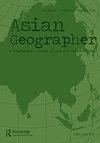人的归化,景观的民族化:推动中国乡村边缘旅游
IF 2.2
Q2 GEOGRAPHY
引用次数: 12
摘要
旅游通常与知识的创造和消费相结合,以塑造人们感知、想象和理解“其他”地方的方式。本文探讨了旅游宣传的意象和框架如何利用和回报中国少数民族、农村和人民的建构。通过对一个乡村和民族旅游胜地的宣传形象的分析,讨论突出了旅游表现如何以一种反映国家旅游经济高度国家管理性质的方式反映国家话语和意识形态。利用福柯式的框架,通过创造知识和规范话语来概念化权力的传播,旅游业被呈现为中国国家能够定位和划分空间和民族群体的渠道。因此,旅游宣传材料不仅被理解为吸引游客的关键手段,而且成为理解中国民族权力不平衡的纽带。审查的宣传材料强调宣传图像传播理想化叙事和图像的方式,这些叙事和图像在空间上定位少数群体,并在社会和文化上将他们联系起来。本文章由计算机程序翻译,如有差异,请以英文原文为准。
Naturalizing people, ethnicizing landscape: promoting tourism in China’s rural periphery
ABSTRACT Tourism is often used in conjunction with the creation and consumption of knowledge to mold the ways in which people perceive, imagine and understand “other” places. This article examines how the imagery and framing of tourism promotion both utilizes and reciprocates constructions of China’s ethnic minority, rural places and peoples. Through an analysis of the promotional imagery of a rural and ethnic tourism resort, the discussion highlights how tourism representations mirror state discourses and ideologies in a manner that reflects the highly state-managed nature of the nation’s tourism economy. Utilizing a Foucauldian framework that conceptualizes the dissemination of power through the creation of knowledge and normalizing discourses, tourism is presented as a conduit through which the Chinese state is able to position and delimit spatial and ethnic groups. Thus, not only are tourism promotional materials understood as a key means through which to entice tourists, they become a nexus through which to understand China’s ethnic power imbalances. The examined promotional materials highlight the ways in which promotional imagery disseminates idealized narratives and imagery that locate minority groups spatially, and tie them socially and culturally.
求助全文
通过发布文献求助,成功后即可免费获取论文全文。
去求助
来源期刊

Asian Geographer
GEOGRAPHY-
CiteScore
3.30
自引率
0.00%
发文量
7
期刊介绍:
Asian Geographer disseminates knowledge about geographical problems and issues focusing on Asia and the Pacific Rim. Papers dealing with other regions should have a linkage to Asia and the Pacific Rim. Original and timely articles dealing with any field of physical or human geographical inquiries and methodologies will be considered for publication. We welcome, for example, submissions on people-environment interactions, urban and regional development, transport and large infrastructure, migration, natural disasters and their management, environment and energy issues. While the focus of the journal is placed on original research articles, review papers as well as viewpoints and research notes under the category of “Asian Geography in Brief” are also considered. Review papers should critically and constructively analyse the current state of understanding on geographical and planning topics in Asia. The ‘Asian Geography in Brief’ section welcomes submissions of applied geographical and planning research about Asia. The section aims to showcase (1) the diverse geography and planning of Asia; and (2) the diverse geographical and planning research about Asia. The journal will also publish special issues on particular themes or areas. Book reviews can be included from time to time.
 求助内容:
求助内容: 应助结果提醒方式:
应助结果提醒方式:


